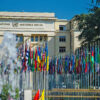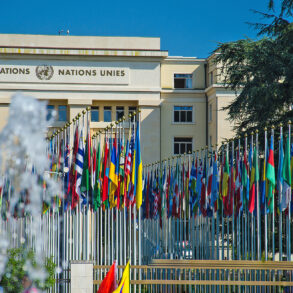Bosnia, like the rest of the Balkans, is rich in scholarship that could be a model for all that passes for the West.
(Islamic Times) – Tijana Šarac was born in Bosnia in 1988 and fled with her family to Germany in 1992 at the outbreak of war. We talked to the author, editor and literary translator about her old homeland, formative memories and the beauty of the country and its people.
What does Bosnia mean?
Question: Dear Tijana Šarac, you have lived in Germany since your family fled the war. What does Bosnia-Herzegovina, its people and culture mean to you?
Tijana Šarac: Bosnia is first and foremost a warm feeling for me, the place where I was born. I couldn’t stay there for long, but the soil from which we sprang shapes us all our lives and carries meaning, even if we only come to understand it much later in life.
The land and its people, still the most beautiful symbol of the coming together of different realities of life in the disintegrated Yugoslavia, have always had a meaningful effect on me, because I myself was born of an ethnically mixed marriage.
The place that gave a home to this reality until the outbreak of war was Bosnia. Despite the tragedy of war, it is of enormous importance for a child growing up as a refugee that the place where his or her complex identity once emerged received this child benevolently and the cornerstones for a happy childhood were in place.

Photo: Ammar Asfour
The people in my hometown who set the framework for this have remained the same to this day and have not allowed themselves to be seduced by either the upheavals or new ideologies into anything other than the love and generosity with which they have always welcomed me. For me, that is precisely Bosnian culture.
I suppose that the fact that this country has spent the modern era almost constantly in a state of war makes people more relaxed about fate, and the little things in life – a cup of coffee, a good conversation and neighbourly help – are given greater importance than perhaps elsewhere. Traditions may be cultivated, and people have to work, but my experience of this beautiful homeland is that simply being together is the most important thing.
Question: What material and/or spiritual aspects are of lasting importance to you?
Tijana Šarac: Materially, our first visit after the war was a culture shock. As a twelve-year-old, I asked myself if this could still be Europe at all. There were bullet holes in the houses everywhere, some villages still looked like they did a hundred years ago, and the food rarely contained too many ingredients, because you didn’t have much. This first experience gave me a queasy feeling, not knowing if the war could really be over when everything seemed so fragile and wounded.
When I finally listened to the adults’ conversations, saw my relatives and observed the people in their daily lives, I was left with nothing but amazement at the incredible resilience in the face of death, poverty and destruction. I think that is the spiritual legacy that I was able to take with me and that I always try to remember when things go badly.
Is there a Bosnian perspective?
Question: Is there a specific Bosnian perspective on “God and the world”?
Tijana Šarac: It seems to me that a particularly Bosnian characteristic is to look at God and the world with a certain mixture of melancholy and serenity. There is an old folk song in which it is sung that one should let love who loves himself, because in Namet (compulsion) there is no Selamet (peace).
The old songs and stories always carry a kind of melancholy through the fate suffered, wrapped in a defiant lightness out of the knowledge that “life is just the way it is.” There is always a good pinch of realism in the Bosnian temperament, which is perhaps why no religious fanaticism or crude austerity guide the way of life for most.
The language makes it so that we usually refer to God as the “dear God,” which betrays our basic understanding of the Creator and His dealings with His creation, and is also our greatest hope for the world to come. When someone dies, we say ”he/she has moved to the Akhira,” which to me is a very endearing and wise way of dealing with death. There is no real end, and death is a step in the journey.
Question: Can the typical Bosnian Muslim be described at all? Are there any specific characteristics about you?
Tijana Šarac: I don’t think there is a typical Bosnian Muslim. If you look at the families who have protected their Din and passed on the knowledge despite political upheavals, you will find people with deep roots and impressive knowledge. This mix of roots and knowledge makes them steadfast in the face of new kinds of ideologies and foreign influence.
If you then look at those who are predominantly culturally Muslim, you may not find the same density of sound scholarship, and the roots may also be somewhat weakened, so that the overlying plant can be more easily blown to and fro by the wind when it comes to religious practice.
However, I have not yet met anyone who does not carry the actual knowledge, that of God’s mercy and love for the Prophet, sallallahu alaihi wa sallam, and who often simply lives this knowledge without many words.
As a teenager, I was once visiting home and a friend of mine wanted to accompany me to my mother’s grave. We arranged a day for it. He worked as a waiter and wanted to go to the cemetery with me after his shift. Shortly before we were to meet, he called me and apologised that he couldn’t go there with me today because he had rashly drunk a beer at work. With alcohol in his blood, he didn’t want to enter the cemetery and couldn’t recite a fatiha for my mother. So, we made up another day and both visit and fatiha reached my mother.
This has remained a lasting memory and lesson for my later life. We may not be perfect and commit mistakes daily, but as long as we have sincere decency towards Allah and His Messenger, the heart remains awake and alive, and the Lord is Exalted above all this and ever forgiving.

Photo: Petr Bonek, Shutterstock
Question: Have you had the experience so far that your environment or other people – regardless of their origin – know enough about the country of your birth? If not, where would there be a need to catch up?
Tijana Šarac: Most people don’t know too much about the region. Often even Muslims don’t know that there is a traditionally Muslim area in Europe, where there is no question about being Muslim and European at the same time.
There would be a need to catch up here, especially because it would be an enrichment for others, and could possibly mean a consolidation of their own identity for Muslims in the West, if they did not have to look outside their own homeland, this continent, for an amalgamation of knowledge, tradition, culture and spirituality that has taken place naturally and for centuries in this place.
Question: Even among many Muslims, their Bosniak brothers and sisters are often seen or described only in the context of war and displacement. Do you also have the feeling that they are often denied a subject character?
Tijana Šarac: My assumption is that this context arises from benevolence and “compassion,” and that is understandable as well as commendable. One wants to draw attention to what happened, the danger of which has not really passed until today. Reminder and attention remain important in our context (and ours).
But I don’t think we are only seen in this image, but also as intellectuals and as jokers and as good friends and sometimes as shrewd car dealers. But all stereotypes aside, getting to know each other is the best way to experience and understand nuances.

Photo: Ammar Asfour
Contributions to the Muslims of Europe
Question: Linked to this is the question of what contributions Muslims from this part of Europe can make to the continent and the global Muslim community?
Tijana Šarac: As already indicated, Bosnia, like the rest of the Balkans, is rich in scholarship that could be a model for all that is considered the West in terms of tolerance, coexistence of different ethnicities and religions, and well-founded knowledge that not only allows but considers essential the diversity of opinions and realities of life as well as the interpretations of our Din.
Question: In a few months, the travel season will start again. Since tourism is becoming more and more expensive, especially for families, alternatives such as Montenegro are becoming more attractive. Do you think Bosnia would be a nice alternative here? And what should tourists have seen and done?
Tijana Šarac: Since I am also Montenegrin, I can and must recommend Montenegro, of course! Both countries are beautiful, bordering and wonderfully complementary. You could, if you wanted to, arrive in Sarajevo by plane, explore the city and its surroundings, later discover Travnik, and decide whether the cevapcici there are tastier than those in Sarajevo.
By car, you could continue south into Herzegovina, discovering gems like Stolac, where you’ll find Roman and Illyrian remains, and Mostar, with its venerable bridge, and finally travel further down into Montenegro to experience traditional Muslim culture and charming mosques in towns like Pljevlja, too.
At some point you will arrive at the sea, for example in Bar or Ulcinj. In the latter town, you’ll find a nice mix of Bosniak and Albanian Muslims embedded in Venetian, Ottoman and modern history, surrounded by Mediterranean Sea breezes and Balkan serenity. Why not enjoy it all when it is so generously offered?
Dear Tijana Šarac, thank you for the interview.











